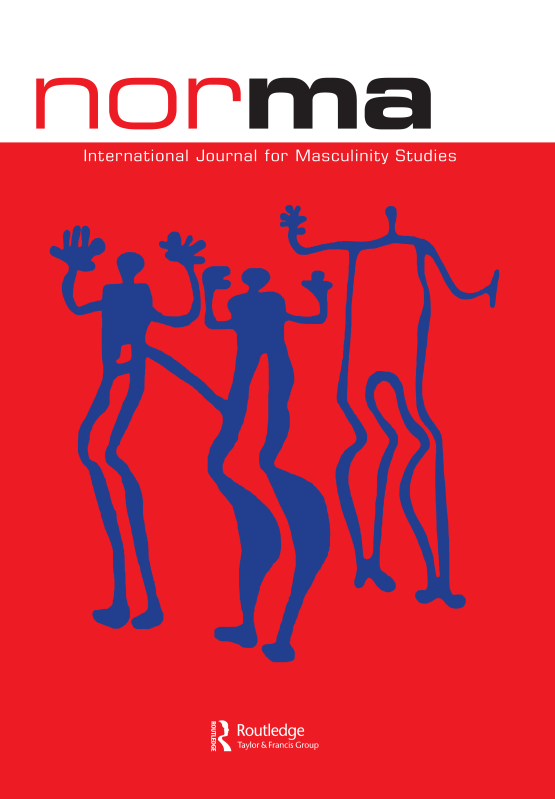Submit a Manuscript to the Journal
NORMA
For a Special Issue on
Men, Masculinities and the Planet at the End of (M)Anthropocene: Ecological/social/economic/political Relations, Processes and Consequences
Abstract deadline
01 November 2024
Manuscript deadline
01 March 2025

Special Issue Editor(s)
Kadri Aavik,
Associate Professor of Gender Studies, School of Governance, Law and Society, Tallinn University
[email protected]
Jeff Hearn,
Professor Emeritus, Hanken School of Economics, Finland; Senior Professor, Human Geography, Örebro University, Sweden; Professor of Sociology, University of Huddersfield, UK
[email protected]
Martin Hultman,
Associate professor in Science, Technology and Environmental Studies at Chalmers University of Technology
[email protected]
Tamara Shefer,
Professor, Women’s and Gender Studies, Faculty of Arts and Humanities, University of the Western Cape, South Africa
[email protected]
Men, Masculinities and the Planet at the End of (M)Anthropocene: Ecological/social/economic/political Relations, Processes and Consequences
In recent decades, the notion of the Anthropocene has become widely known and used, not only in academic debates, but also increasingly in mainstream discourses, to refer to a human-induced ecological crisis of planetary dimensions. Notwithstanding contestations about the term, the unprecedented effects that humans are imposing on Earth are beyond questioning. Zooming in on how such impacts are gendered started fifty or more years back, but studying how masculinities play a role is still uncommon, if no longer novel. In this special issue we bring together original articles and commentaries on the planet, our world, as a spatial and temporal arena for men and masculinities. The special issue will highlight such planetary issues as climate, environment, the more-than-human, energy, sustainability, ecological justice, working between ecological, social, economic and political dimensions, and various (m)Anthropocenic encounters. We understand the (m)Anthropocene as intersectionally gendered, classed and racialised, and driven by (post)colonial patriarchal racial capitalism where not all humans are equally implicated in Anthropocentric damages nor have the capacity to survive through them in the same way.
What is at stake is not that whether we are in a new era, but that the Anthropocene already in progress, indeed has begun generations before us, and we, ever so blindly, still follow in its footsteps in the name of ‘progress’, including the largely unquestioned but deeply unsustainable ideal of economic growth and development. Even worse, not only are the effects of environmental issues distributed unevenly along the lines of gender, race, class, but also the assumed objective sustainable solutions such as conservation/’nature’ protection policies are shown to create unliveable conditions for already marginalized groups, especially in the Global South. At the same time, massive environmental threats enacted by dominant masculinities, such as wars and military capitalism, consumerism and modern slavery, fossil fuel and energy crisis, and digital waste pollution, industrial animal agriculture, to name a few, are left mostly undiscussed. While the past, present, and the future look bleak, grassroots activism, such as Fridays for Future network of climate strikers, international gender equity organizations, MenEngage and Swedish MEN, are bringing together work and action on men, masculinities and care for the wellbeing of the Earth. Changing gendered hegemonies are also core in the coming-of-age Degrowth movement, gathering scholars and activists alike, and figuring out ways of living well within the planetary boundaries.
To this special issue we welcome empirical, analytical, theoretical and methodological contributions from various disciplines and theoretical approaches, such as gender studies, ecofeminism, history, geology, Indigenous studies, decolonial theories, environmental humanities, feminist posthumanities, feminist animal studies, and feminist science and technology studies (STS). We especially welcome non-eurowestern/Global Southern, queer, non-binary and trans, queercrip, and indigenous perspectives and voices to challenge the dominant often implicitly white and western epistemologies and empirical data. We understand ‘men’ and ‘masculinities’ as fluid, multiple, shifting and non-essentialized. We welcome contributions that examine the interrelatedness of the ecological and social dimensions of climate change, ecological crises and other key processes in the (m)Anthropocene. We are also interested in transdisciplinary and transmodal approaches to men, masculinities and the planet that go beyond global political economy and work across the boundaries of the social and the climatic, the human and the non-human.
We invite contributions focusing on men and masculinities for example in relation to the following themes:
- Ecological justice
- Ecological/disaster vulnerability
- Climate resistance and (posthuman) resilience
- Ecofascist masculinities and anti-eco-masculinities
- Super-rich men
- Environmental care and common survival
- Environmental apartheid, Eco-apartheid, climate apartheid
- Capitalist extractivism
- Environmental impacts of war and the military-industrial complex
- Diverse critical approaches to climate crisis
- Green colonialism, environmental racism, Indigenous, postcolonial, critical race and decolonial perspectives on the (m)Anthropocene
- The (m)Anthropocene represented in culture, art, and media
- Capitalism and degrowth
- 'Nature' preservation and wildlife conservation
- Ecologies of life/ecologies of death, environmental grief
- Sustainable development, energy crisis, circular economy
- Climate change scepticism and denial
- Land, ice and water (e.g., flooding, droughts, fires)
- Climate sciences and technologies
- (Im)mobility and transportation
- Climate catastrophe and environmental crisis
- Land-based knowledges and eco-histories, macrohistory perspectives
- Body, embodiment and climate change
- (Pro)feminist, intersectional, and Indigenous environmental activism and organization, environmental solidarity
- Consumerism and environmental impact, greenwashing
- More-than human life/beings (including non-human animals), the animal-industrial complex
- Changes in men and masculinities in the (m)Anthropocene
Looking to Publish your Research?
Find out how to publish your research open access with Taylor & Francis Group.
Choose open accessSubmission Instructions
- Deadline for abstracts (max. 500 words + author bio of ca. 100 words): 1st November 2024
- Notifications by: 10th November 2024
- Deadline for articles: 1stMarch 2025
- Envisaged publication date: 15th September 2025
Contributions in English are accepted.
Please refer to the author guidelines for details.
Abstracts should be submitted to the special issue editors:
Kadri Aavik ([email protected])
Jeff Hearn ([email protected])
Martin Hultman ([email protected])
Tamara Shefer ([email protected])